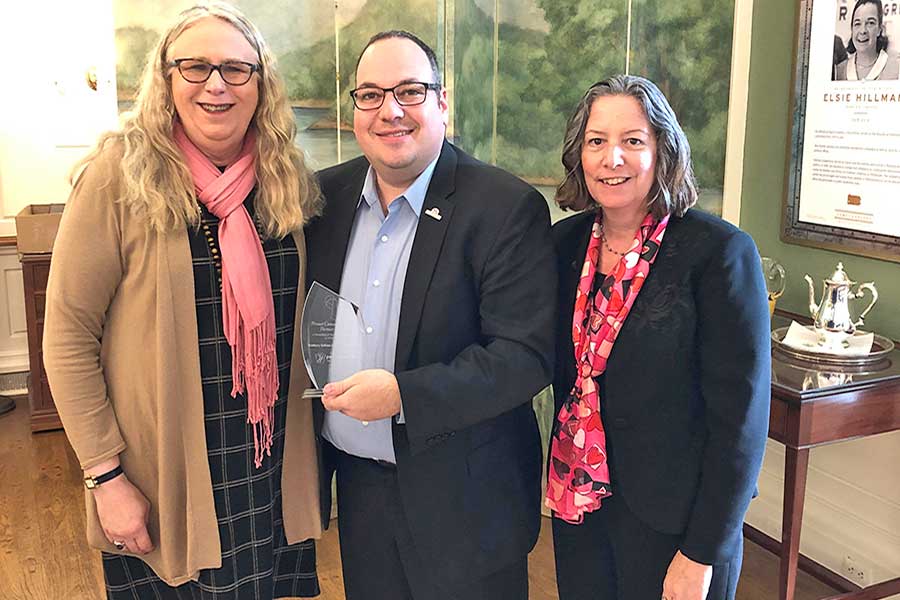Allentown-based Bradbury-Sullivan LGBT Community Center received the 2019 Breast Cancer Community Partner Award from the Pennsylvania Commission for Women last Friday for its data collection through the Pennsylvania LGBT Health Needs Assessment.
The Pennsylvania Commission for Women advises Gov. Tom Wolf on issues affecting women across the Commonwealth. The group’s commissioner BJ Leder joined Pennsylvania Secretary of Health Rachel Levine and Todd Snovel, the executive director for the Pennsylvania Commission on LGBTQ Affairs, last week in presenting the award to the Bradbury-Sullivan LGBT Community Center’s Executive Director Adrian Shanker and Claire Ippoliti, breast cancer survivor and board treasurer for the Lehigh Valley organization, at the Pennsylvania Governor’s Residence in Harrisburg.
Bradbury-Sullivan Center was the lone LGBTQ organization among the 10 honorees, which also included Philadelphia nonprofit Health Promotion Council, PA Breast Cancer Coalition, Danville-based Geisinger Medical Center and Northeast Regional Cancer Institute in Scranton.
“It’s nice to be recognized, but it’s more important that the work that we’re doing is making a difference,” Shanker told PGN, adding that the data the Bradbury-Sullivan Center collects “is crucial to being able to promote a high quality of health for all people, including breast cancer screenings for LGBT people with breast tissue.”
Bradbury-Sullivan LGBT Community Center administers the Pennsylvania LGBT Health Needs Assessment every two years in collaboration with the state Department of Health with the intent of collecting comprehensive data on LGBT health disparities, including those in breast cancer screenings, Shanker said. The tool was first used regionally at the end of 2015 and start of 2016, and then across the Commonwealth in 2018.
Last year’s responses came from 4,679 LGBT-identified Pennsylvanians from more than 800 zip codes across 64 of the Keystone State’s 67 counties, Shanker said. Philadelphians accounted for 10 percent of participants.
The 2018 assessment revealed that among participants over age 40 and assigned female at birth, 13 percent had never had a mammogram, a breast X-ray that detects early signs of cancer. The results skyrocketed for trans and gender-nonconforming people in the same age range who self-identified as eligible for a mammogram, showing that 46 percent had never had the exam.
“LGBT community members need to get screened for breast cancer because early detection can save lives. It’s not just a slogan to those of us who are survivors — it’s real,” Ippoliti said. “And we need information, like the data Bradbury-Sullivan LGBT Community Center collects through the needs assessment, to demonstrate that here in Pennsylvania, we have an issue with LGBT people not receiving these screenings.”
Bradbury-Sullivan Center’s needs assessment finds that one of the main reasons LGBTQ folks don’t receive mammograms is fear of accessing health care, Shanker said.
One-fourth of responders said they aren’t out to any of their health care providers, and more than 56 percent indicated they “sometimes, often or always” are afraid of negative reactions from medical professionals, Shanker told PGN. This rate jumps to 75 percent among the trans community.
Spaces that provide gender-related cancer care, such as mammograms and cervical cancer screenings, can sometimes be exclusionary, Shanker said.
“They can sometimes be places where LGBT people don’t feel safe or comfortable accessing care,” he added. “So for lesbian, bisexual women or transgender men, not every health care provider is providing culturally appropriate care to them. We know that these barriers to care sometimes prevent people from accessing the care that they need, especially when it comes to cancer screenings.”
The Human Rights Campaign released a report last month stating that LGBTQ Americans “remain largely invisible to the local, state, and federal officials charged with ensuring their health, safety, and wellbeing” due to a lack of government data collection efforts focused on the queer community.
Such findings underscore the “critical” need for data collection efforts like the Pennsylvania LGBT Health Needs Assessment, Shanker said.
He added Bradbury-Sullivan Center’s goal is for the findings to be used by health care providers, public health agencies, LGBTQ organizations and insurance companies to inform more-inclusive health care practices.
“When we understand the disparities, then we can work to address them,” Shanker said. “It’s very hard to work to address the disparities without the data.”
The next Pennsylvania LGBT Health Needs Assessment will take place in 2020.
